China has become infamous for a second "Great Wall", this time in the digital domain. The so-called "Great Firewall" prevents dissidents from voicing their opposition, and the country's citizenry from exposure to Western influence. At the same time, it blocks numerous websites that are part of most people's everyday life (outside of China, of course).
To find out whether one of your favorite sites is blocked, have a look at our Internet censorship checker. Should you want to access any of these websites while visiting China or living there, you'll need a VPN.
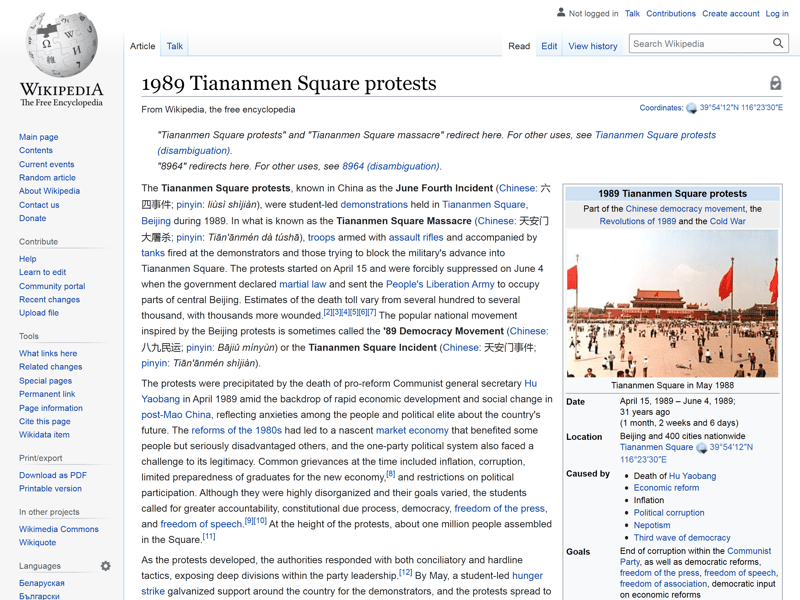
Wikipedia is blocked in China because it contains information that casts the ruling Chinese Communist Party in an unfavorable light.
VPNs aren't only good for concealing your traffic and helping you surf the Internet anonymously, but they also make it possible to circumvent geo-blocking and restrictions in countries that limit Internet access, like China. Should you find yourself heading there in the near future, and want to be able to access websites like Google or YouTube, a reliable VPN is the best solution.
Unfortunately, not every VPN provider has what it takes to bypass the "Great Firewall", so, we looked at all 27 providers from our sample to see which are useful for your next trip to China, and which are better left at home.
Best VPNs for China
To find out which VPNs can get around the "Great Firewall", we used servers based in China. Of the 27 providers in our sample, we could only establish tunnels with 6 of them, however, this should not be taken as conclusive since VPNs are in a constant cat-and-mouse game with Chinese authorities.
With that said, the providers below demonstrated their ability to help users access websites otherwise blocked and unavailable in China when we tested them:
NordVPN

NordVPN took the top spot in our evaluation, combining ease of use with excellent performance and high security. The provider's server network is formidable and all essential features, including split tunneling, are offered.
The service is also recommended for your next trip to China, however, you will have to pay attention to a few settings. To establish a connection, you'll need to use NordVPN's NordLynx protocol.
Thankfully, despite being one of the best VPN providers on the market, its prices remain reasonable. NordVPN's 2-year subscription is a particularly attractive option for bargain hunters.
EXPERTE.com's winner; powerful combination of features and functionality
Fastest VPN in our speed test
Offers plenty of features, including split tunneling
Limited protocol options
ExpressVPN

In our comprehensive VPN test, ExpressVPN finished just behind NordVPN owing to its high speeds, intuitive user interface, and far-reaching network of 3,000 servers across 94 countries.
However, ExpressVPN also has the dubious distinction of being more expensive than almost all other services from our sample (when considering long-term subscriptions). Its parent company, Kape Technologies, also suffers from a poor reputation, having been accused of being a malware and adware slinger in the past.
To create a connection from China, you'll need to use ExpressVPN's Lightway protocol. During testing, we were able to connect to VPNs in Singapore and Hong Kong from China, and from there, to the US and Germany. Although far from ideal, this allowed us to bypass the "Great Firewall's" restrictions.
Excellent performance
Large server network
Intuitive app
Expensive
Direct connections to German and US servers not possible from China
Suspicious parent company (Kape Technologies)
Surfshark

Surfshark, our price-performance winner, might be relatively new to the VPN market, but don't let that fool you. Thanks to its feature-heavy applications and low price, the provider has already made quite a name for itself, which will only improve as it continues to expand its already respectable server network. In terms of speed, Surfshark came in second place, right on NordVPN's heels.
Although it sounds odd, bringing along this shark on your next trip to China makes sense. The provider even offers a feature for facilitating this called "NoBorders", with which you can circumvent Internet restrictions in general, not only in China. In addition, make sure to activate the Shadowsocks protocol, since many servers won't work with automatic protocol selection enabled.
Offers many features, including split tunneling
Excellent speeds
Bargain 2-year subscription
Server network could be larger
Private Internet Access

Private Internet Access won us over with its sleek and intuitive VPN client which comes loaded with plenty of features and customizable settings. In particular, we really liked the ability to personalize the app by adding or removing modules, a feature unique among the providers in our sample.
We were a bit less thrilled with how the provider performed, posting decent speeds that were only good enough for 12th place in our speed test. As is the case with ExpressVPN above, PIA also belongs to Kape Technologies, which for privacy enthusiasts is a red flag.
With that said, we have no doubts when it comes to PIA's suitability for usage in China: To connect to a foreign server from China, all you'll have to do is select the WireGuard protocol.
Has module-based, customizable apps
Good combination of user-friendliness and features
Massive server network (34,000+ servers)
Average performance during speed testing
Questionable parent company
Windscribe

So far as free VPNs are concerned, Windscribe was one of our favorites, in large part owing to its generous provision of 10 GB of data per month. The software's premium version wasn't all that shabby either, offering up a solid app that puts some interesting features at its users' fingertips. These include "Double Hop" (simultaneously activates two VPN connections) and "Split Personality" (minimizes the risk of browser fingerprinting).
We were disappointed in how the service performed though, with Windscribe finishing near the bottom of our speed ranking. Its lack of external audits also wasn't a positive, since it means we have to take the service at its word not to collect logs, and we don't like doing that.
Should you want to use Windscribe in China, you're in luck! Just remember to download and install its client before departure, as you won't be able to do so once in China (that is to say, without a VPN). When connecting, make sure to select the Stealth protocol.
Intuitive app offering plenty of features like split tunneling and double hop
Affordable subscriptions at flexible prices
Free version with a monthly data limit of 10 GB
Comparably slow speeds
Has not submitted to an external audit
Hotspot Shield

Like Windscribe, Hotspot Shield also made it onto our list of the best free VPNs, offering even more data than its competitor: Free users receive 500 MB every 24 hours, which adds up to 15.5 GB per month.
Alongside unremarkable speeds and performance, we also took issue with the provider for its overly invasive data collection practices and lack of an external security audit.
Beyond that, Hotspot Shield cut a good figure: Its server network is decent, it offers important features like split tunneling, and we didn't have issues streaming content from abroad when using it. Connecting from China also worked without issue, even with automatic protocol selection.
User-friendly applications
Offers split tunneling
Underwhelming performance
Privacy and data collection issues
Has not submitted to any external security audits
How We Tested
To test each service, we purchased a subscription to all providers in our sample, thoroughly evaluating their clients and apps. Individual reviews are divided into six main areas, five of which we scored:
Installation and Features
Here, we looked at the availability and user-friendliness of each VPN, on both desktops and mobile devices. We also paid attention to how many features were offered and what settings can be configured or modified. A good VPN client or app should be intuitive to use and grant access to plenty of features.
Server Network
When it comes to VPN networks, two numbers are important: Servers and server locations. For both, the more, the better.
Performance
In terms of performance, we took a few different aspects into consideration: During our speed test, we measured each provider over an extended period of time. Beyond that, we also looked at how each performed on a day-to-day basis. This isn't just important for surfing and video streaming, but also whether they were able to circumvent the "Great Firewall".
Security and Privacy
For this aspect, we carefully examined each provider's privacy policy, determining whether these are conducive to anonymity or not. We also examined what security practices each provider adheres to, performing VPN leak tests in the process. Finally, we noted whether a provider has submitted to external security audits, if they do so regularly, and whether their privacy or data security practices have been criticized in the past.
Customer Support
In terms of support, we looked for good direct support options (ideally, a live chat) and an equally informative help center containing FAQs, guides, and if possible, video tutorials. For email or ticket support, response times of less than 24 hours translate into good scores.
Which Websites Are Blocked in China?
Plenty of websites that you probably check on a daily basis are censored in China. These include, but are not limited to:
Facebook
Google (as well as most Google apps, like Gmail, or Google Maps)
Instagram
Wikipedia
Spotify
Most news sites, such as the New York Times or Washington Post
In addition, just because a website is available today, doesn't mean that it will be tomorrow. Chinese government censors are constantly on the prowl for content at odds with the CCP's ideology and don't hesitate to block websites or services, even on very trivial grounds. To access the free Internet in China, you'll need a VPN.
You can easily check which websites are available in China and which are blocked with our EXPERTE.com Internet Censorship Checker, which uses servers in Peking, Shanghai, and Shenzhen. All you have to do is input the URL you want to visit, and the tool will tell you whether it's accessible in China or not:
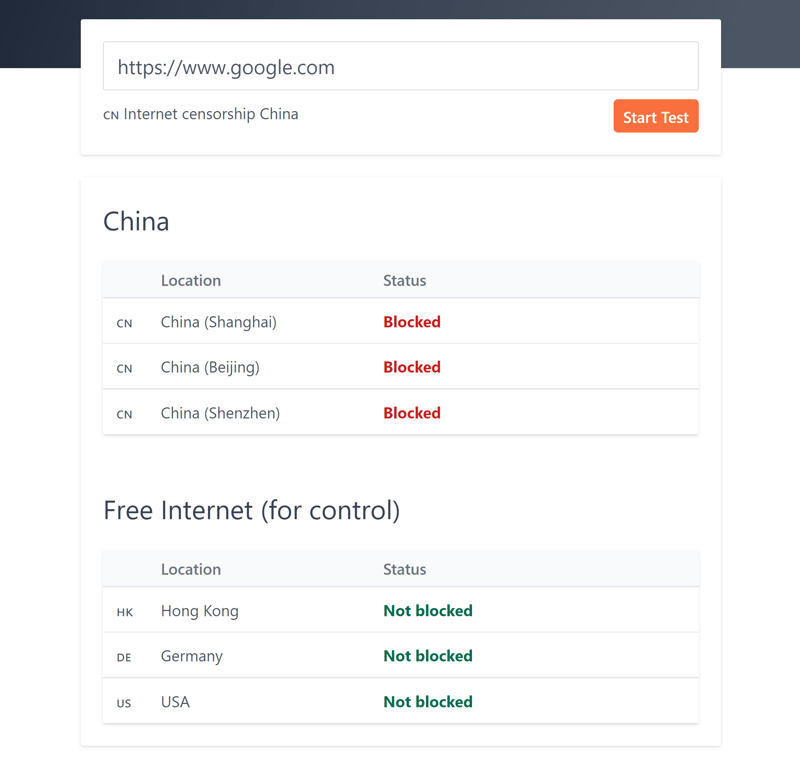
EXPERTE.com's Internet Censorship Checker tells you which websites are available in China.
Guide: How to Use a VPN in China
Have you settled on a VPN provider? In order to use it during your trip to China and get around the Great Firewall, follow these steps:
Step 1: Before you cross the border, download all of the apps offered by the VPN of your choice for your devices. Most of the time, these can easily be found in the user area or a dedicated downloads section of their homepage. For this guide, we used NordVPN, the top performer in our assessment.
Hint: Do this before your trip. Most VPN websites are blocked or unavailable in China.
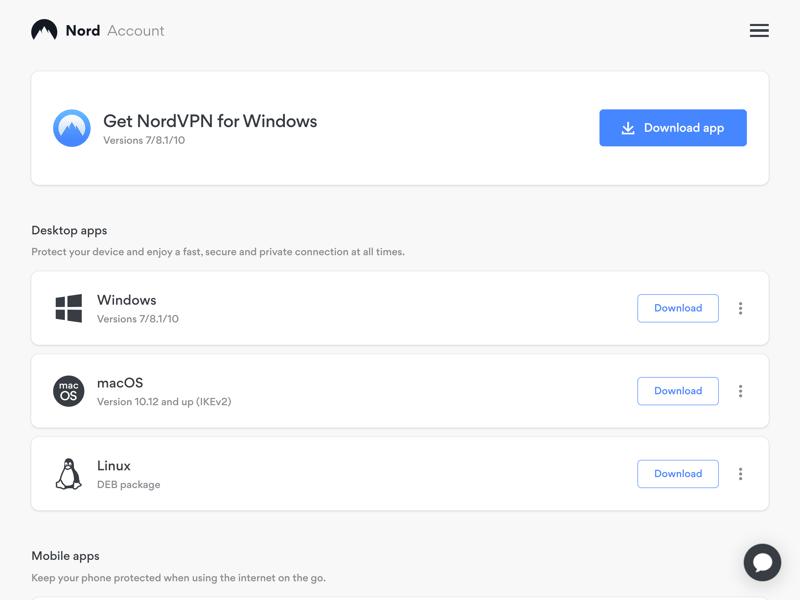
You can find all available apps in NordVPN's download area.
Step 2: Install and open the VPN app. Select a server from the list that you'd like to connect to.
Hint: Connection speeds depend on how physically far you are from the VPN server. For that reason, it's advisable to select a server that's close by, such as in Taiwan or Japan, to optimize your performance.
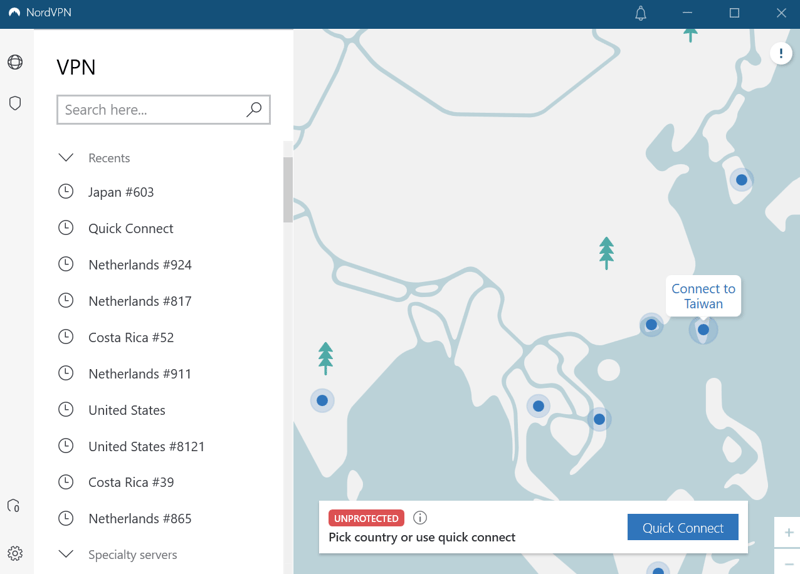
Now, select the VPN server you'd like to connect to.
Step 3: As soon as the VPN connection is established, you can use the Internet just as you would at home and visit sites that would otherwise be blocked in China.
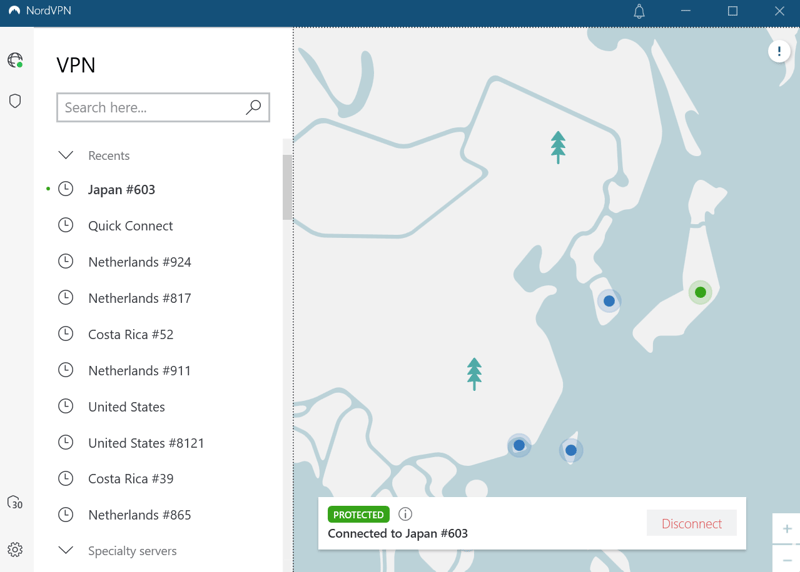
You can easily bypass the Great Firewall with your new VPN connection.
VPN in China: Is It Legal?
Considering how tenaciously the Chinese Communist Party pursues censorship, it's understandable to have a few concerns about whether using a VPN is legal in the PRC. First off, the bad news: Any VPN service that isn't explicitly approved by the Chinese government is prohibited. As such, technically speaking, using a non-authorized VPN to get around the Great Firewall's censorship measures is illegal.
But there's good news too: Most likely, you won't have to fear any adverse consequences, since VPN usage is very common and widespread. We're not aware of any cases where a tourist or visitor experienced any difficulties owing to VPN usage. Still, we think it's important to know where things stand, as well as that from a strictly legal sense, using a VPN in China is forbidden.
Conclusion
Should you want to be able to access Google, YouTube, Netflix, or Facebook during your next trip to China, there's just no getting around a VPN. Unfortunately, not every VPN provider can get around the "Great Firewall", and even some of those that claim to be, couldn't when we tested them.
As of the time of testing, we enjoyed success with the above six providers, however, this can periodically change as Chinese authorities and censors don't take their jobs lightly. We recommend checking shortly before your trip whether the VPN service you're using is effective in China or not, for example, by paying a visit to their user forum or reading a few recent customer reviews.
FAQs
When we evaluated the services from our sample, six were capable of establishing connections from China, namely, NordVPN, ExpressVPN, Surfshark, Private Internet Access, Windscribe, and Hotspot Shield. For most of these, you'll need to select a specific VPN protocol in order to connect, as well as to download and install the provider's client prior to departure.
NordVPN offers excellent performance, solid apps, and a high degree of security, all of which helped it to achieve first place in our comprehensive evaluation. The service is also very affordable, offering excellent performance at a low price. Since NordVPN can bypass the "Great Firewall", it's the best VPN for usage in China in our opinion.
The Chinese government has blocked many online services and websites commonly used by those elsewhere in the world, such as Facebook, Wikipedia, and even Google. To access these while in China, you'll need a VPN.
The Chinese government prohibits the use of non-authorized VPNs. For that reason, providing a clear legal answer is difficult. With that said, using a VPN is likely semi-legal. Since we're not aware of any cases of visitors to China being punished, fined, or jailed for using VPNs, given how common they are in the country, it seems that their usage is not prosecuted.












